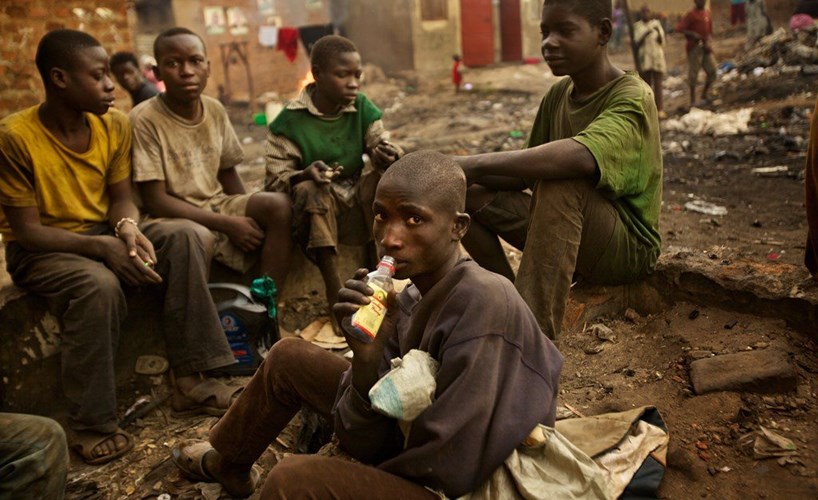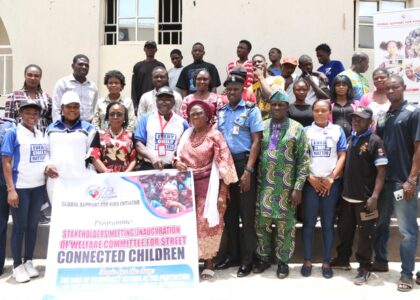“The issue of street-connected children and at-risk youth is a critical challenge in Nigeria. The Vulnerability of these young citizens has reached alarming proportions, demanding urgent attention and comprehensive policy interventions. These vulnerable individuals often endure harsh living conditions, lack access to basic necessities, and face significant risks to their safety and well-being. As a beacon of hope for positive change, the newly appointed President of Nigeria ‘’His Excellency President BOLA AHMED TINUBU’’ holds the power to bring about transformative policy measures that can uplift the lives of these marginalized citizens. This explores the urgent need for enforcement and implementation of policies and highlights key areas that demand attention’’. Said Opeyemi Olajide Olowookere the President Global Support for Kids Initiative”
The plight of these vulnerable children cannot be overemphasized. They face immense challenges on a daily basis, including hunger, poverty, and various forms of danger. Opeyemi Olowookere, who has personally witnessed the harsh realities of these children, strongly advocates for urgent intervention to alleviate their suffering.
As a concerned citizen and a staunch advocate for the welfare of Nigeria’s youth, Mr. Olowookere implores Your Excellency to take immediate steps to address the critical situation faced by these young citizens. By doing so, we can provide them with a glimmer of hope and a chance for a better future.
During his address with the media and staff of Global Support for Kids Initiative on June 12th, 2023, Opeyemi Olowookere emphasized the importance of understanding the severity of the problem at hand in order to effectively address it. He highlighted the situation in Nigeria, where thousands of children are found living on the streets, facing numerous challenges such as homelessness, poverty, lack of education, healthcare, and unstable shelter. These circumstances make them highly vulnerable to exploitation, abuse, and involvement in criminal activities.
Olowookere also mentioned that at-risk youth, often influenced by poverty, insufficient social support, and limited opportunities, can become trapped in a cycle of destitution. This cycle denies them their basic rights and prevents them from having a safe and nurturing environment in which they can flourish.
By recognizing the magnitude of this issue, Olowookere emphasized the need for focused policy interventions. Understanding the scale of the problem helps to set the stage for targeted approaches aimed at addressing the root causes of child homelessness, poverty, and deprivation in Nigeria.
Investing in Education and Skill Development:
Education plays a pivotal role in breaking the cycle of poverty and providing children and youth with a pathway to a better future. His Excellency should prioritize policies that ensure universal access to quality education for street children and at-risk youth. This includes initiatives to establish functional schools in marginalized areas, providing scholarships and incentives to encourage enrollment, and implementing vocational training programs to equip them with practical skills for employment.
Strengthening Social Welfare Systems:
A robust social welfare system is crucial for safeguarding the well-being of street connected children and at-risk youth. The President should strive to enhance existing social support programs, such as welfare grants, healthcare services, and counseling facilities, specifically tailored to address the unique needs of this vulnerable population. Additionally, fostering collaborations with non-governmental organizations (NGOs) and community-based initiatives can strengthen the support network available to these individuals.
The Role of Policy:
Implementing and enforcing policies tailored to the specific needs of street children and at-risk youth is a pivotal step towards addressing their challenges effectively. These policies should encompass various dimensions, including education, healthcare, social welfare, and reintegration programs. By establishing a solid policy framework, the president can create an enabling environment that fosters the social, emotional, and intellectual development of these individuals
Tackling Root Causes: Poverty and Inequality:
Poverty and inequality lies at the heart of the street children and at-risk youth crisis. The President should prioritize policies aimed at reducing poverty rates and promoting social equity. This involves implementing comprehensive poverty alleviation programs, fostering economic growth, and creating sustainable livelihood opportunities for families living in impoverished conditions. By addressing the root causes, the President can prevent future generations from falling into the same cycle of street life.
Rehabilitation and Reintegration:
While prevention is crucial, the President must also focus on rehabilitation and reintegration efforts for those already affected. Establishing well-equipped rehabilitation centers and shelters that offer counseling, healthcare, and vocational training will help reintegrate street children and at-risk youth back into society. Moreover, forging partnerships with private entities and community organizations can provide employment opportunities and mentorship to facilitate their successful transition.
Collaboration and Accountability:
Addressing the plight of street children and at-risk youth requires a multi-stakeholder approach involving government agencies, civil society organizations, international partners, and the private sector. The president should actively engage these stakeholders, fostering collaboration, sharing of best practices, and mobilizing resources to ensure the effective implementation of policies.
Strengthening child protection laws and policies to prevent child abuse, exploitation, and trafficking and raising awareness campaigns to sensitize the public on the importance of protecting children and youth and the dangers of street life are crucial.
Yes, Nigeria has laws, policies, and rights that aim to protect children living in street situation and at-risk youth but it’s worth noting that despite these laws and initiatives, challenges remain in the implementation and enforcement of these measures. However, The President, the Nigerian government, civil society organizations, and international partners should continue to work towards improving the situation and protecting the rights of street children and at-risk youths said Opeyemi Olowookere. Here are some key initiatives and legal frameworks in Nigeria:
Child Rights Act: In 2003, Nigeria implemented the Child Rights Act, which extends its protective reach to all children within the country. This crucial legislation ensures the fundamental rights of children, including those who are street-connected or at risk. Its primary aim is to safeguard children from exploitation, abuse, and neglect, while also emphasizing their entitlement to education, healthcare, and a secure environment. Regrettably, the rights of street children are currently being disregarded, resulting in their deprivation and marginalization within society. These children face neglect, stigmatization, and marginalization, which lead to their voices being silenced and unheard.
National Policy on Child Labor: The Nigerian government has taken a proactive step in addressing the concerning issue of child labor by developing a comprehensive National Policy on Child Labor. This policy specifically targets at-risk youth and street children who are often vulnerable to exploitation. Its primary objective is to eradicate child labor entirely and provide necessary support to affected children. However, it is imperative that this policy be thoroughly examined to assess its effectiveness in achieving its goals. A comprehensive review is necessary to evaluate the impact of the policy, identify any gaps or shortcomings, and propose necessary improvements. By conducting an in-depth analysis, policymakers can ensure that the National Policy on Child Labor is truly effective in combating child labor and safeguarding the rights and well-being of all children in Nigeria.
Universal Basic Education (UBE) Act: UBE was enacted in 2004, is a crucial piece of legislation that guarantees every Nigerian child the right to free, compulsory, and universal basic education, including street-connected children. The primary objective of this act is to ensure that all children, regardless of their socio-economic background, have access to quality education. It is, however, disheartening to note that there are still challenges hindering the full implementation of the UBE Act. One of such challenges is the fact that not all children have access to free education as stipulated by the Act. This has resulted in the deprivation of education for street children and at risk youth who are already vulnerable and in need of assistance. It is important that we work together to ensure that the provisions of the UBE Act are fully implemented, and that every Nigerian child, especially street-connected children, have access to quality education without any financial burden. This is not only a legal obligation but also a moral responsibility that we owe to our children and the future of our nation.
National Agency for the Prohibition of Trafficking in Persons (NAPTIP): In 2003, the establishment of NAPTIP marked a significant step in the fight against human trafficking, including the trafficking of children, in Nigeria. This organization is dedicated to proactive measures aimed at preventing child trafficking, prosecuting perpetrators, and offering comprehensive support and rehabilitation services to victims, including vulnerable street children susceptible to exploitation. However, there is a concerning issue regarding the inadequate monitoring and access to services provided by NAPTIP. The effectiveness and accountability of its members need improvement to ensure proper oversight and efficient delivery of their vital mission.
Rehabilitation Centers for Street Children: In Nigeria, the government, in partnership with NGOs and international organizations, initiated the establishment of rehabilitation centers and shelters dedicated to assisting street children. These centers were designed to offer temporary housing, education, vocational training, healthcare services, and counseling to facilitate the successful reintegration of street children into society. However, there is growing concern that these centers have deviated from their intended purpose, resulting in inadequate care and support for the children residing there.”
National Social Investment Programs (NSIP): The Nigerian government introduced the National Social Investment Program (NSIP), encompassing a range of social welfare initiatives aimed at reducing poverty and assisting vulnerable groups, including at-risk youth. These programs offer financial aid, skills training, and other forms of support to enhance their livelihoods. However, there are concerns that certain individuals driven by financial gain are neglecting and marginalizing these children, depriving them of the benefits intended by the program.
Opeyemi said establishing robust monitoring and evaluation mechanisms will help hold accountable those responsible for the implementation and enforcement of these policies.
His Excellency President Bola Ahmed Tinubu has a unique opportunity to bring about significant change in the lives of street children and at-risk youth. By prioritizing the enforcement and implementation of these policies that address their specific needs, such as education, social welfare, prevention, poverty reduction, and rehabilitation, the President can pave the way for a brighter future for these marginalized individuals. It is through the president’s leadership and commitment that Nigeria can take a significant step towards building an inclusive and just society, where every child has the opportunity to thrive. It is imperative that this call for policy action is heard and acted upon, ensuring that no child or young person in Nigeria is left behind on the streets, but rather, given the support and opportunities they deserve.







This is one awesome blog article.Really looking forward to read more. Keep writing.
It is quite enjoyable for me to read through a piece that can provoke thought in both men and women. Please accept my gratitude for allowing me to leave a comment.
Good post! We will be linking to this particularly great post on our site. Keep up the great writing
naturally like your website however you need to check the spelling on quite a few of your posts. A number of them are rife with spelling issues and I find it very troublesome to tell the reality then again I¦ll certainly come again again.
Some genuinely interesting points you have written.Helped me a lot, just what I was looking for : D.